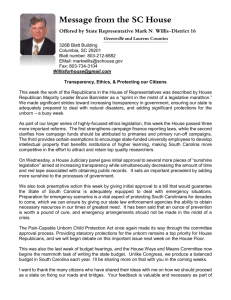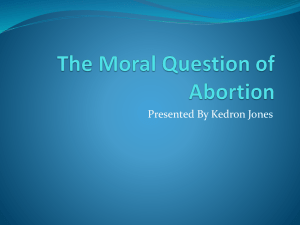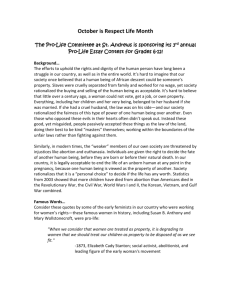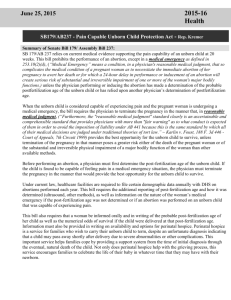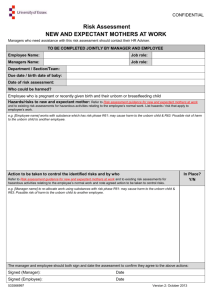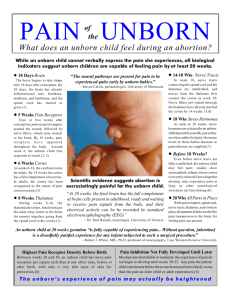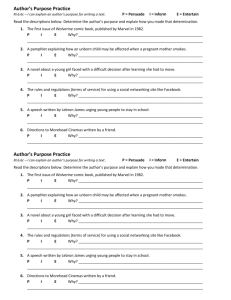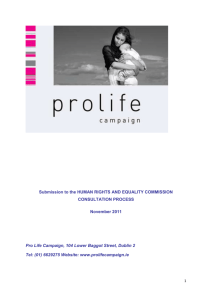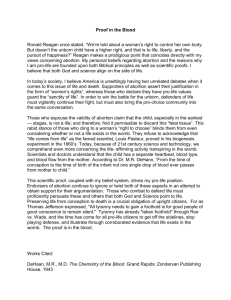Abortion - Commonwealth Policy Center
advertisement
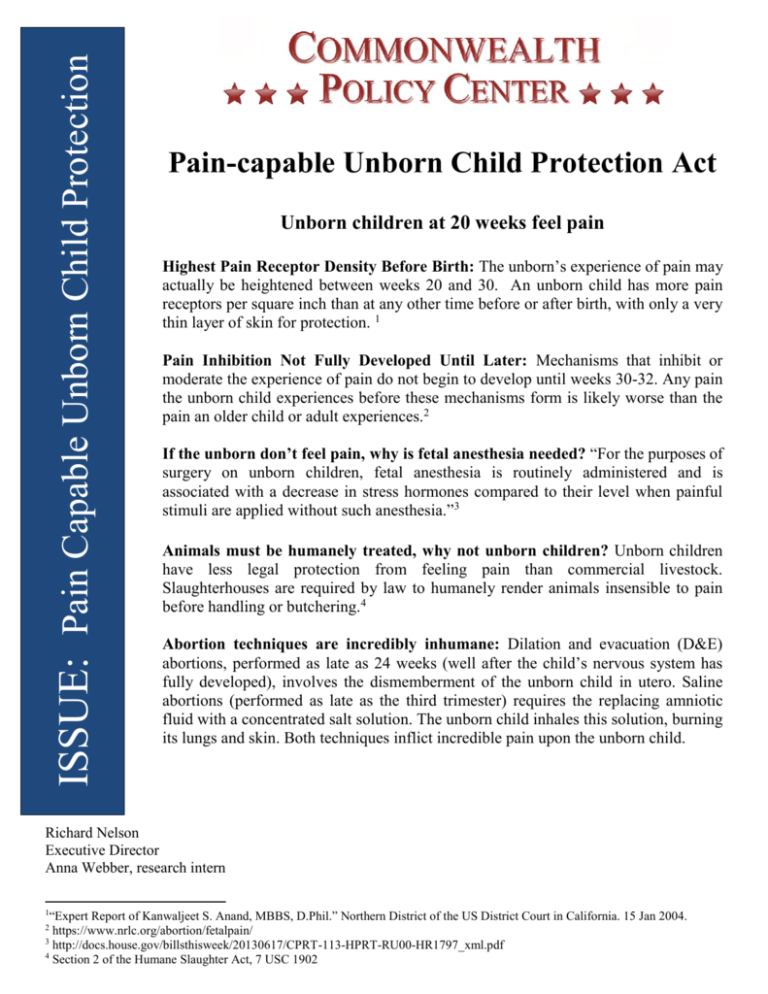
ISSUE: Pain Capable Unborn Child Protection Pain-capable Unborn Child Protection Act Unborn children at 20 weeks feel pain Highest Pain Receptor Density Before Birth: The unborn’s experience of pain may actually be heightened between weeks 20 and 30. An unborn child has more pain receptors per square inch than at any other time before or after birth, with only a very thin layer of skin for protection. 1 Pain Inhibition Not Fully Developed Until Later: Mechanisms that inhibit or moderate the experience of pain do not begin to develop until weeks 30-32. Any pain the unborn child experiences before these mechanisms form is likely worse than the pain an older child or adult experiences.2 If the unborn don’t feel pain, why is fetal anesthesia needed? “For the purposes of surgery on unborn children, fetal anesthesia is routinely administered and is associated with a decrease in stress hormones compared to their level when painful stimuli are applied without such anesthesia.”3 Animals must be humanely treated, why not unborn children? Unborn children have less legal protection from feeling pain than commercial livestock. Slaughterhouses are required by law to humanely render animals insensible to pain before handling or butchering.4 Abortion techniques are incredibly inhumane: Dilation and evacuation (D&E) abortions, performed as late as 24 weeks (well after the child’s nervous system has fully developed), involves the dismemberment of the unborn child in utero. Saline abortions (performed as late as the third trimester) requires the replacing amniotic fluid with a concentrated salt solution. The unborn child inhales this solution, burning its lungs and skin. Both techniques inflict incredible pain upon the unborn child. Richard Nelson Executive Director Anna Webber, research intern “Expert Report of Kanwaljeet S. Anand, MBBS, D.Phil.” Northern District of the US District Court in California. 15 Jan 2004. https://www.nrlc.org/abortion/fetalpain/ 3 http://docs.house.gov/billsthisweek/20130617/CPRT-113-HPRT-RU00-HR1797_xml.pdf 4 Section 2 of the Humane Slaughter Act, 7 USC 1902 1 2 What the experts are saying “The neural pathways are present for pain to be experienced quite early by unborn babies.” – Steven Calvin, perinatologist, University of Minnesota. An unborn child at 20 weeks gestation “is fully capable of experiencing pain… Without question, [abortion] is a dreadfully painful experience for any infant subjected to such surgical procedure.”5 – Robert J. White, MD., Ph.D. professor of neurosurgery, Case Western Reserve University. “Pain receptors are present throughout the unborn child’s entire body by no later than 20 weeks after fertilization and nerves link these receptors to the brain’s thalamus and subcortical plate by no later than 20 weeks after fertilization.”6 “At 20 weeks, the fetal brain has the full complement of brain cells present in adulthood, ready and waiting to receive pain signals from the body, and their electrical activity can be recorded by standard electroencephalography (EEG)” – Dr. Paul Ranalli, neurologist, University of Toronto Trends According to a July 25, 2013 Washington Post/ABC News poll, 56 percent of Americans support banning abortion after 20 weeks.7 Only 27 percent of respondents said they would prefer to uphold the current 24-week threshold. Eleven states, including most recently North Carolina and Texas, have Pain-capable Unborn Child Protection laws in effect. These states include: Nebraska, Kansas, Idaho, Oklahoma, Alabama, Georgia, Louisiana, Arkansas, North Dakota, Texas, and North Carolina.8 The U.S. House of Representatives passed the Pain-capable Unborn Child Protection Act on June 18, 2013 by a vote of 228-196. North Carolina Governor Pat McCrory said "These higher standards will result in safer conditions for North Carolina women. This law does not further limit access and those who contend it does are more interested in politics than the health and safety of our citizens."9 Texas Governor Rick Perry said "This is an important day for those who support life and the health of women in Texas. Signing HB2 further solidifies the foundation on which the culture of life in Texas is built.”10 Conclusion The Pain-capable Unborn Child Protection Act is pro-woman legislation in that it is a restriction on abortionists and not women. The Pain-capable Unborn Child Protection Act is pro-science. It takes the latest science into consideration and implements it into public policy. Pain-capable Unborn Child Protection Act is humane legislation. Unborn children capable of experiencing unimaginable pain from abortion must be protected in Kentucky. http://clinicquotes.com/professor-of-neurosurgery-says-unborn-babies-feel-pain/ quoted in “Pain of the Unborn: What does an Unborn Child Feel during an abortion?” National Right to Life Education Trust Fund, Washington D.C. 2004 6 http://www.doctorsonfetalpain.com/wp-content/uploads/2013/02/Fetal-Pain-The-Evidence-Feb-2013.pdf 7 http://articles.washingtonpost.com/2013-07-25/politics/40863499_1_abortion-clinics-abortion-laws-saying-abortion 8 http://nrlc.org/press_releases_new/Release061713.pdf 9 http://articles.chicagotribune.com/2013-07-29/news/sns-rt-us-usa-abortion-northcarolina-20130729_1_abortion-clinics-safety-andopponents-new-standards 10 http://www.lifesitenews.com/news/gov.-perry-signs-texas-abortion-restriction-bill-into-law/ 5
